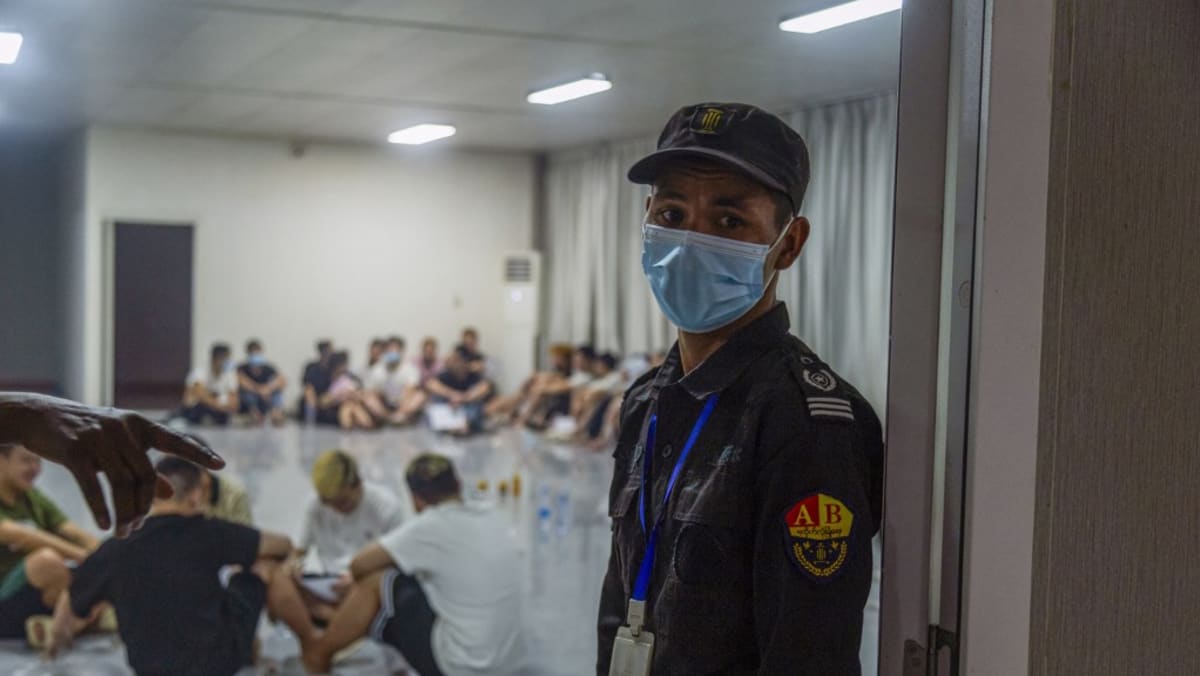Asia
Myanmar militia says ready to deport 10,000 cyber scam workers

Combating Cyber Scams: A Growing Challenge in Southeast Asia
In recent months, Southeast Asia has emerged as a hotspot for cyber scams, with organized criminal groups operating sophisticated fraud networks that span borders. These operations, often masked as legitimate business ventures, have drawn attention from law enforcement agencies, militias, and international authorities. One such location is Shwe Kokko, a sprawling compound in Myanmar’s eastern Myawaddy township, which has been identified as a hub for cyber fraud and human trafficking. The compound, situated in an area controlled by the Border Guard Force (BGF), has become a focal point in the region’s efforts to combat these crimes. On Friday, BGF soldiers were seen patrolling the premises as part of a broader crackdown on alleged human trafficking activities.
The Shwe Kokko Scam Compound: A City of Deception
Shwe Kokko stands out as a stark anomaly in the otherwise rural landscape of Karen state. Surrounded by agricultural fields, the compound has evolved into a built-up city, complete with infrastructure that supports its illicit activities. Cyber scam compounds like Shwe Kokko operate by luring individuals from around the world with promises of high-paying jobs. However, upon arrival, victims are often held hostage and forced to participate in online fraud schemes. These scams typically target vulnerable individuals, including job seekers and migrants, who are drawn by the promise of lucrative opportunities. Once trapped, victims are subjected to harsh conditions and forced to commit fraud or face severe punishment, making it nearly impossible for them to escape.
Raids and Rescues: A Show of Authority
Authorities in Myanmar and Thailand have stepped up efforts to dismantle these scam centers, conducting high-profile raids to rescue victims and apprehend perpetrators. These operations are often publicized to demonstrate the commitment of law enforcement agencies to addressing the issue. The compounds have also been linked to other criminal activities, including drug smuggling and gambling, further highlighting the need for concerted action. Recently, Thai police reported the deportation of 10 Chinese nationals linked to a high-profile kidnapping case involving an actor who was rescued from a cyber fraud center in Myanmar. The suspects were part of a gang operating in Myawaddy, south of Shwe Kokko, and were allegedly involved in defrauding Chinese citizens.
Mass Rescues and International Collaboration
The scale of the problem is evident in the sheer number of victims rescued from these compounds. Over 250 foreign nationals from more than a dozen countries were recently rescued from an online scam center in Kyauk Khet, located 50 kilometers south of Shwe Kokko. The victims were handed over to Thai authorities on Wednesday, marking a significant success in the ongoing efforts to combat cyber fraud in the region. These rescues underscore the importance of international collaboration in addressing transnational crimes. Law enforcement agencies in Myanmar and Thailand are increasingly working together to identify and dismantle scam networks, as well as to repatriate victims to their home countries.
Militia Groups Take Action
In addition to government-led efforts, militia groups like the BGF are playing a key role in combating human trafficking and cyber fraud. BGF Major General Saw Chit Thu released a statement on Thursday, asserting the militia’s commitment to "identifying, arresting, and suppressing human traffickers and fraudsters who are illegally operating within investment projects in our region." This statement highlights the growing involvement of local militias in maintaining law and order, particularly in areas where state authority is limited. The BGF’s actions serve as a reminder of the complex security landscape in Myanmar, where non-state actors often wield significant influence.
The Ongoing Battle Against Cyber Fraud
The fight against cyber scams and human trafficking in Southeast Asia is far from over. As authorities continue to raid and shut down scam centers, new networks are likely to emerge, adapting to evolving technologies and law enforcement strategies. The success of these efforts will depend on sustained international cooperation, as well as the ability of local authorities to address the root causes of these crimes, such as poverty, lack of employment opportunities, and corruption. For now, the rescues and arrests serve as a beacon of hope for victims and a warning to perpetrators that their activities will not go unchecked.











